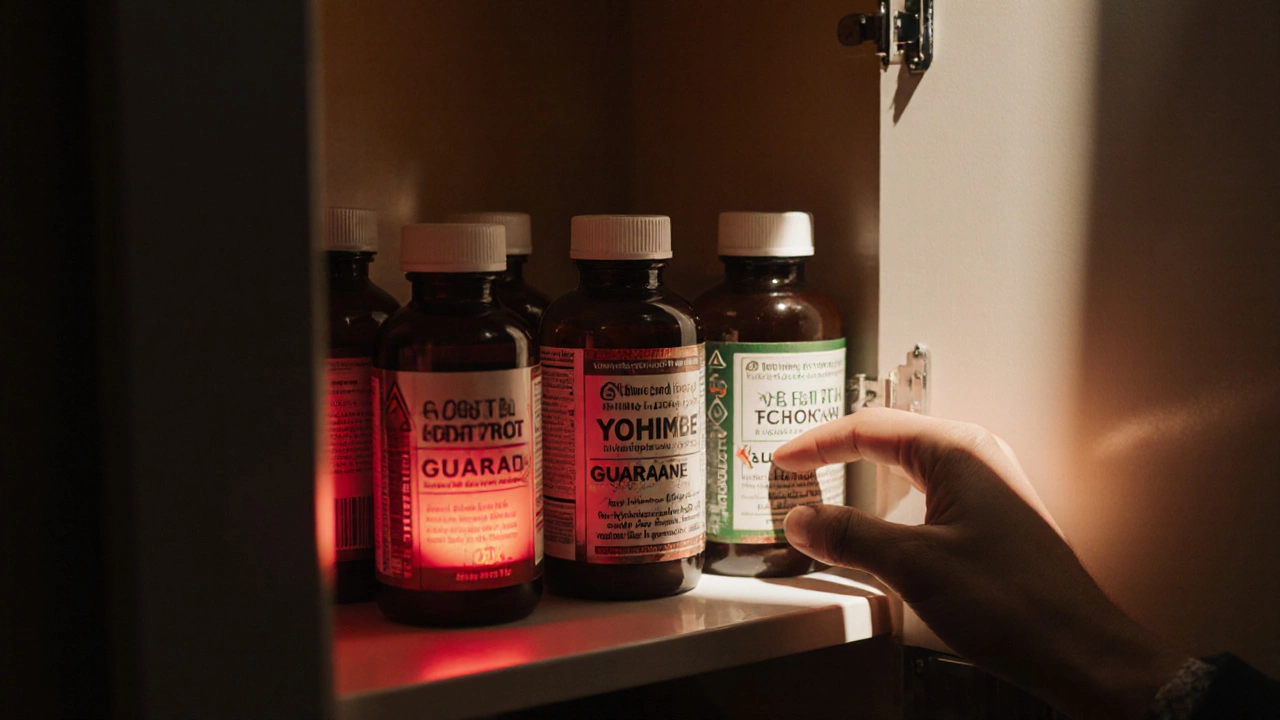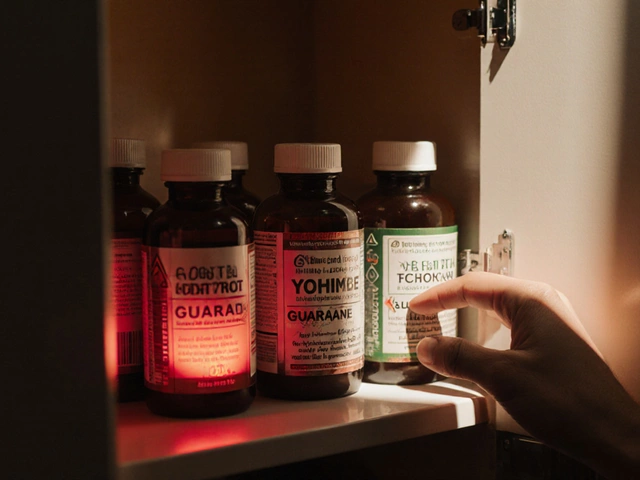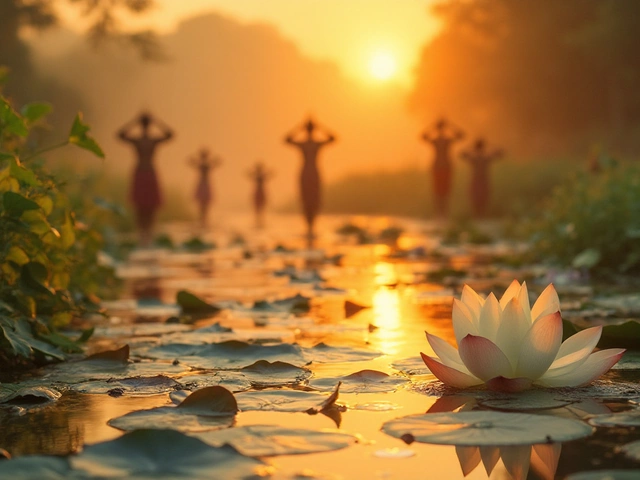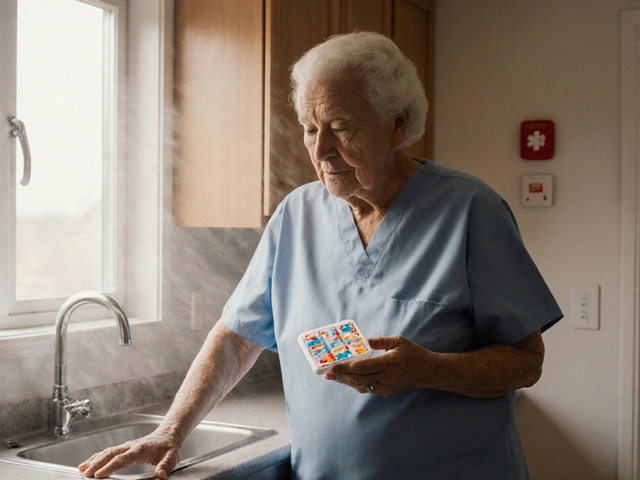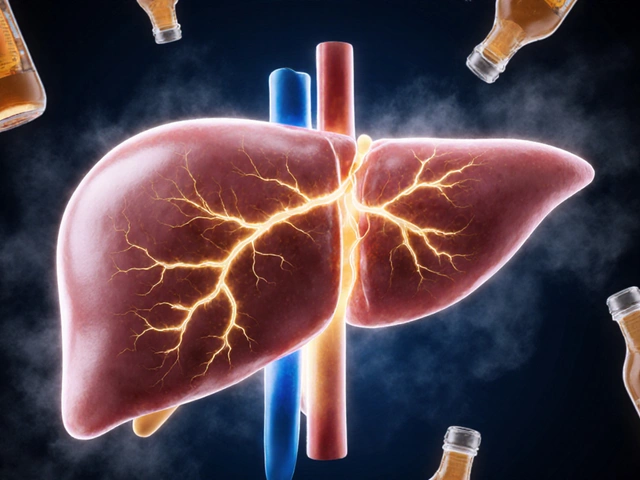Herbal Anxiety Risk Checker
Check Your Herbal Supplement Risk
Select the herbs you're taking to see if they might be contributing to your anxiety symptoms.
Your Risk Assessment
Many people turn to herbal supplements hoping to feel calmer, sleep better, or boost their energy. But what if some of these natural remedies are secretly making your anxiety worse? It’s not just caffeine or sugar-certain herbs commonly sold as "natural" or "safe" can trigger or amplify anxiety symptoms. If you’ve been taking herbal supplements and notice your heart racing, your mind spinning, or panic creeping in, it might not be stress. It could be what’s in your supplement bottle.
St. John’s Wort: The Depression Herb That Can Backfire
St. John’s Wort is one of the most popular herbs for mild depression. It’s sold everywhere-from grocery stores to online supplement shops. But here’s the catch: it affects serotonin, dopamine, and norepinephrine levels in the brain. For some people, especially those with underlying anxiety disorders, this can lead to overstimulation. A 2023 study in the Journal of Clinical Psychopharmacology found that nearly 1 in 5 participants using St. John’s Wort reported increased nervousness, restlessness, or panic attacks within two weeks. It’s not just a theory-people are reporting it in real life. If you’re taking it for mood support and suddenly feel jittery or on edge, stop and talk to your doctor.
Green Tea Extract: More Than Just a Healthy Drink
Green tea is fine. A cup or two a day? Usually harmless. But green tea extract? That’s a different story. Concentrated capsules can contain 10 to 20 times the caffeine of a regular cup. Some brands even add synthetic stimulants to boost metabolism. High-dose green tea extract has been linked to insomnia, rapid heartbeat, and panic-like symptoms. The FDA has issued warnings about liver damage from these extracts, but few people realize they can also trigger anxiety. If you’re taking green tea extract for weight loss or energy, and you feel wired even at night, it’s likely the culprit.
Yohimbe: A Dangerous Stimulant in Disguise
Yohimbe comes from the bark of an African tree and is marketed as a natural aphrodisiac or fat burner. But it’s also a powerful stimulant. Yohimbine, its active compound, increases adrenaline and norepinephrine-exactly the same chemicals your body releases during a panic attack. The American Herbal Products Association has flagged yohimbe as potentially unsafe for people with anxiety disorders. In one case report, a 32-year-old man developed severe anxiety, trembling, and hallucinations after taking just one 10mg capsule. It’s not rare. Yohimbe is banned in several countries for good reason. Avoid it entirely if you’re prone to anxiety.
Ephedra (Ma Huang): A Banned Herb That Still Lingers
Ephedra was banned by the FDA in 2004 for causing heart attacks and strokes. But you can still find it in some online supplements labeled as "traditional Chinese herb" or "energy booster." It’s the same plant that gave us pseudoephedrine, but in much higher doses. Ephedra directly stimulates the central nervous system. People who take it report chest tightness, racing thoughts, and intense anxiety attacks. Even small doses can be dangerous. If a supplement says it contains "Ma Huang," "Ephedra sinica," or "herbal ephedrine," walk away. There is no safe dose for someone with anxiety.
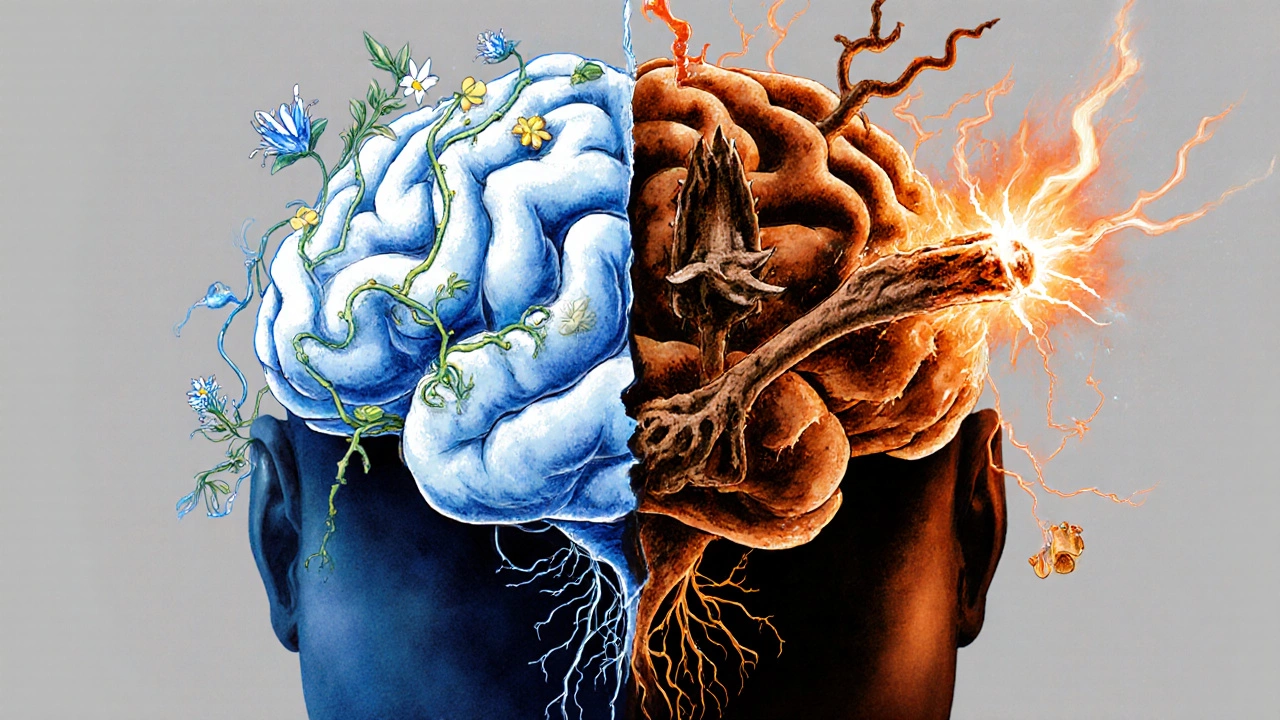
Guarana: Hidden Caffeine in Plain Sight
Guarana is a South American seed that’s packed with caffeine-sometimes more than coffee beans. It’s added to energy drinks, weight loss pills, and even some "natural focus" supplements. The problem? It’s not labeled clearly. One 500mg guarana capsule can equal 40-80mg of caffeine. That’s like drinking two strong cups of coffee all at once. For someone sensitive to caffeine, that’s enough to trigger palpitations, sweating, and a feeling of dread. If your supplement lists guarana but doesn’t say how much caffeine it contains, assume it’s high. And if you already feel anxious, avoid it.
Asian Ginseng: The Energy Booster That Overstimulates
Asian ginseng (Panax ginseng) is prized in traditional medicine for boosting stamina and mental clarity. But it’s also a stimulant. Unlike adaptogens like ashwagandha, ginseng can overexcite the nervous system. A 2022 review in Phytomedicine noted that up to 12% of users reported insomnia, irritability, and nervous tension. People who take it for fatigue often feel more wired than energized. If you’re using it to fight burnout and end up feeling like you’ve had too much coffee, ginseng might be the issue. Try switching to American ginseng, which is milder and less stimulating.
Kava: The Calming Herb That Can Backfire
Kava is often called the "herbal valium." It’s used for relaxation and sleep. But here’s the twist: not all kava products are the same. Low-quality kava made from stems and leaves-not just the root-can contain compounds that irritate the nervous system. Some users report increased anxiety, muscle twitching, or even paranoia after taking it. The liver risks are well known, but the anxiety side effects are less discussed. If you’ve tried kava and felt more anxious afterward, it might be the extract, not your mind. Stick to high-quality, root-only kava from trusted sources-or avoid it altogether if you have a history of anxiety.
What to Do If You Suspect an Herb Is Causing Anxiety
If you think one of these herbs is making you anxious, don’t just quit cold turkey. Some herbs, like St. John’s Wort, can cause withdrawal symptoms if stopped abruptly. Instead:
- Write down everything you’re taking-supplements, teas, powders. Include doses and times.
- Stop one herb at a time. Wait 5-7 days between each stop to see if symptoms improve.
- Track your anxiety levels daily. Use a simple 1-10 scale.
- Check labels for hidden stimulants: guarana, yohimbe, ephedra, caffeine anhydrous.
- Consult a doctor or pharmacist who knows about herbal interactions.
Most people feel better within a week of removing the trigger. Anxiety isn’t always in your head-it can be in your supplement bottle.
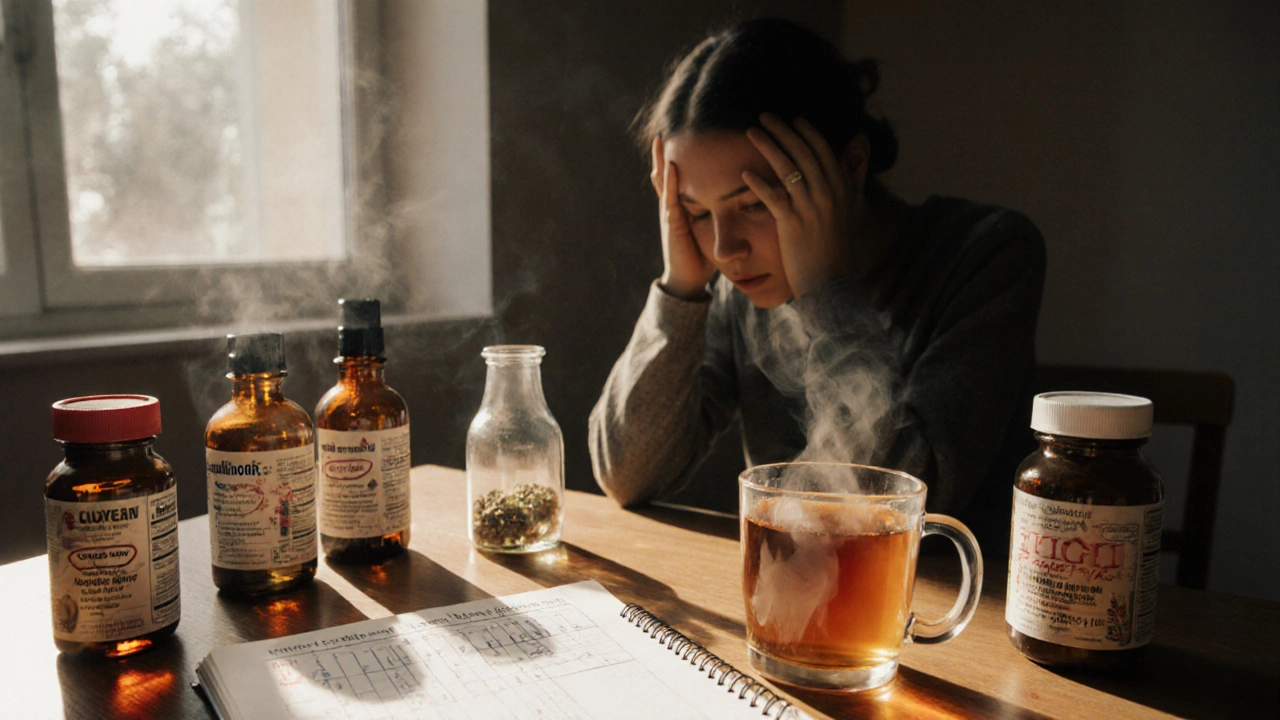
Herbs That Are Generally Safe for Anxiety
Not all herbs are risky. Some actually help. Ashwagandha, lemon balm, and chamomile have solid research backing their calming effects. Magnesium and L-theanine (from green tea leaves, not extract) are also well tolerated. But even these can cause issues in high doses or with certain medications. Always start low and go slow.
When to See a Doctor
See a healthcare provider if you experience:
- Heart palpitations that don’t go away
- Difficulty breathing or chest tightness
- Thoughts of panic or dread without a trigger
- Symptoms lasting more than a week after stopping the herb
These aren’t normal side effects. They’re signs your body is reacting badly. Your doctor can help rule out other causes and suggest safer alternatives.
Final Thought: Natural Doesn’t Mean Safe
The supplement industry isn’t tightly regulated. Labels can be misleading. "Natural" doesn’t mean harmless. Just because something comes from a plant doesn’t mean it’s gentle on your brain. Many of the herbs that cause anxiety are sold as health products-sometimes even in the same aisle as tea and vitamins. Be curious. Be cautious. And if something makes you feel worse, it’s okay to stop.
Can herbal supplements cause anxiety even if I’ve taken them for years?
Yes. Your body can change over time. Hormones, stress levels, medications, or even gut health can make you more sensitive to herbs you used to tolerate. A supplement that was fine for five years might suddenly trigger anxiety. This is common with stimulant herbs like ginseng or green tea extract.
Are organic or wildcrafted herbs safer for anxiety?
Not necessarily. Organic means no synthetic pesticides, but it doesn’t change the herb’s chemical effects. Wildcrafted herbs can be more potent or contaminated with other plants. The risk of anxiety comes from the active compounds in the herb, not how it’s grown. Always check the species and part used-like root vs. leaf-because they have different effects.
Can I take herbal supplements with my anxiety medication?
Some can be dangerous. St. John’s Wort interacts with SSRIs and can cause serotonin syndrome. Kava can increase the sedative effect of benzodiazepines. Even ashwagandha may lower blood pressure too much if taken with beta-blockers. Always tell your doctor what supplements you’re taking. Never combine herbs with prescription meds without professional advice.
Why do some people get anxious from herbs while others don’t?
It depends on genetics, metabolism, and existing mental health. Some people have a faster version of the CYP450 liver enzyme, which processes herbs differently. Others have a history of panic disorder or are sensitive to stimulants. Dose matters too-what’s safe for one person can be too much for another. There’s no universal rule. Pay attention to your own body’s signals.
What’s the safest way to try a new herbal supplement for anxiety?
Start with the lowest possible dose. Take it for 3-5 days and watch for changes in sleep, heart rate, or mood. Avoid multi-ingredient blends-stick to single herbs so you know what’s causing a reaction. Buy from brands that provide third-party lab testing (look for USP or NSF certification). And never use herbs as a replacement for therapy or prescribed treatment without consulting a professional.
Next Steps
If you’ve been taking herbal supplements and feel more anxious, start by reviewing your bottle labels. Look for the herbs listed above. Cut one out. Wait. Observe. Keep a simple journal. You might be surprised how quickly things improve. Your anxiety doesn’t have to be a life sentence-sometimes, the fix is as simple as removing the wrong herb.
